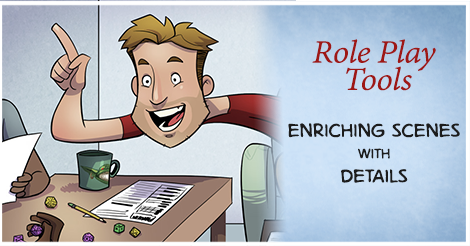Details are the best! Well, ice cream is the best, but details come a close second.
Details make scenes and characters more memorable, more interesting. They allow a story to flourish. They help differentiate and emphasize, so each session, each encounter, stand on their own.
Here are a few easy to use tools that can help you add interesting details to any scene, on the spot.
Detailed descriptions can be useful in several ways:
- They increase immersion. A detailed world feels more real, and helps with the willing suspension of disbelief. “This is a room” doesn’t actually take me somewhere; “This is a majestic hall decorated by dozens of fresh flowers” forces me to imagine a something, a somewhere.
- They add atmosphere. Details can bring horror to Horror, or fantasy to Fantasy. A magical fountain isn’t really magical until there are also fairies dancing in the air above it, or ancient text written on its crumbling edges.
- They can be used in the story later on. If it’s been established that there are vines hanging from the ceiling, then when the characters fight the kobolds in the room, these vines can be used by the players in various interesting ways.
- They can inspire you to take the story down unexpected paths. A piece of detail invented on the spot can add some unintended – but very welcomed – facts and/or be used to justify facts retroactively. For example, if a player described a daughter standing by the prince, you as a GM can accept that new fact and maybe suddenly see his whole (upcoming!) betrayal in a new light, his motivations and reasoning changing on the spot. It’s a lot of fun for a GM who enjoys being surprised.
You don’t need to necessarily think about all of these factors when giving details. Not everything you describe must be created with forethought about its potential use – most of the time, these uses arise by themselves, if and when they are needed (the players will decide on their own what’s an important detail, and what’s not). The important things is to have details.
One important caveat: Keep in mind the Law of Conservation of Details. TV and Movies have taught us that if something is detailed, it’s important. If you describe three red doors, “one of them deep red, blood-red, with trails of rust”, the players will flock to that door. This can be a good thing, it helps you guide them toward something, but it can also be an obstacle, if they grab the wrong detail. One solution to this is to be flexible, and turn it the other way around – whatever detail they decide to folllow, that’s the important one. See GUMSHOE and 13th Age for more ideas along these lines.
Ask the Players
This is very simple: Whenever a scene begins, or something in it changes in a big way, turn to the players and ask each of them to add a new detail, something new, beyond the basic description you’ve already given.
Here are a few things you should consider:
- Ask for a type of detail that helps establish an atmosphere. “Give me something dangerous looking about these orcs” make the orcs feel like a threat even if they didn’t do anything yet. “Everyone, give me one festive thing about this dining hall” creates a relaxed environment, especially if it’s immediately joined with a jovial NPC.
- Use questions to help find inspiration. “Danny, tell me something about this scene” is a bit vague, too general. For some people it’s hard to just invent something out of nothing, so you should give them something to hang on to: “Danny, tell me something about the merchant”. You can also try to guide them to a specific direction, maybe to add a specific atmosphere. “Danny, what’s suspicious about this merchant?”
- Take what they suggest, and expand on it. Say you’re asking for details in order to make a combat scene on the docks more interesting. One player says “There’s a barrel at the end of the alley.” Great, take that and expand: “..and it’s full of wet fish.” See Specific is Better than General, below.
- If it doesn’t work, discard it and explain why. Say you ask for interesting objects in the laboratory on board a derelict spaceship, and one player says “A lion cub”. Well, it could happen, but the question isn’t if it’s plausible, rather if it works within the confines of your plans (which are, in turn, based on the genre conventions you’ve all agreed upon). If you find a way for it to work, great. Your plans, after all, should be malleable. But if not, say so, and explain why: “We’ve already established this spaceship belonged to the insectoid Zamboo, I don’t see why they would have any need for lions.” If the players and yourself can’t come up with an idea – suggest something more acceptable, along those lines. “Maybe it’s a larvae of some alien creature from the Zamboo homeworld?”
Specific is Better than General
Whenever you describe something, and you’d like it to have some importance, make it slightly more specific than you first intended. Just add an adjective, that should be enough. Here are some examples:
- It’s not just a door, it’s a wooden door. Even better, it’s a worm-ridden wooden door.
- You see an old woman, wearing a worn black robe. And she’s smiling.
- I am the monk who studied the Seven-Winds fighting techniques… in the Shrine of the Peaks… from the Blind Masters.
- The coins you find in the dragon’s hoard all have the head of the 3rd Emperor on them.
Each piece of specific detail is a hook that can be expanded upon later. That’s especially useful if something happens later on that you’d like to retroactively justify.
Let’s say the PCs almost kill a major NPC, before he manages to do the cool spell or activate the cool machine you wanted to have as part of this scene – you can say his skull-like mask holds necromantic powers that give him renewed life, for just a few moments more. If it was just a mask, would you have thought about this solution? Even better, if it was a player who suggested the mask should have skull features, that player would probably feel responsible in a way. This is a useful feeling, since it help alleviate the fear of asspulls.
This can also work in the player’s favour. Say the player who has the monk character wants to take an ability not usually associated with his PCs class. Well, although not all monks can glimpse the future, let’s say in the Shrine of the Peaks they teach you that trick (instead of the ability you were supposed to get, they think it’s lame). That explains why other monks don’t have this ability.
As already noted, details are awesome. Like lovely plants in your back yard, you should allow them to flourish, pick the ones that make the most sense to bring inside the house, and be careful to trim the ones that seem to grow into man-eating monstrosities.




